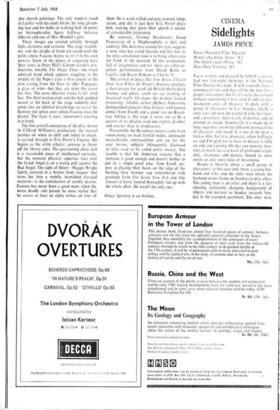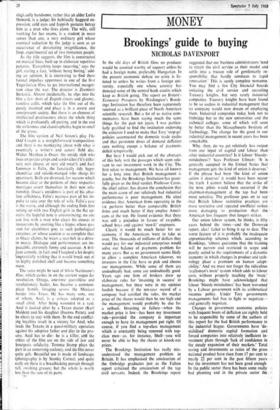CINEMA
Sidelights
JAMES PRICE
Faces (National Film Theatre) Rondo (Academy Three. 'A') The Odd Couple (Plaza, 'A') Blue (New Victoria, 'A') Faces, written and directed by John Cassavctes. had two late-night showings at the National Film Theatre last week. It will assuredly have a commercial run, and that will be the time for a proper assessment: but I can't write this column without mentioning it first, even if only to utter incoherent cries of pleasure. It deals with a group of characters in Los Angeles, chiefly a sixty year old man, his youngish wife, her lover. and a prostitute; there is talk of divorce, and an attempt at suicide. Structurally it is made up of long sequences involving different permutations of character and mood. It is not in the least a tricksy film, but it is idiomatic, often bafflingly so, and I'm glad not to have to discuss it fully on only one viewing. On that one viewing, how- ever, it .struck me as a work of profound origin- ality, resonance and density, bound to some extent to alter one's view of the cinema.
Rondo is likewise about a small group of characters; in this case only three, a young hus- band.and wife, and the older man whom the husband invites home on Sundays to play chess. The young man is an artist and there is a fas- cinating, constantly changing background of objects and pictures as Sunday succeeds Sun- day in the cramped apartment. The other man, eltzi...cally handsome, rather like ah older Leslie Howard, is a judge; his habitually haggard ex- pression, cold eyes and foppish gestures betray him as a man who lives alone. The wife, still working for her exams, is a student in more senses than one, a very ordinary girl whose eventual seduction by the judge is seen as an occurrence of devastating insignificance, the limp, experimental act of two immature people.
As the title suggests, the film is constructed on musical lines, built up in elaborate repetitive patterns. 'Everything keeps recurring,' says the girl, stating a fact, 'without being boring,' add- ing an opinion. It is interesting to find these formal impulses uppermost in one of the first Yugoslavian films to get international recogni- tion since the war. The director is Zvonimir Berkovic. Almost incidentally, he slips into the film a few shots of Zagreb streets and gloomy, tasteless cafés, which take the film out of the purely invented and place it in a severe and omnipresent society. But there is an element of intellectual preciousness about the whole thing which is profoundly off-putting. and in the end the airlessness and claustrophobia begin to smell of the grave.
The film version of Neil Simon's play The Odd Couple is a straightforward transposition, and there is no monkeying about with what is essentially a writer's and actors' field day. Walter Matthau is Oscar, the untidy slob who lives on potato crisps and sandwiches (`it's either very new cheese, or very old meat'); and Jack Lemmon is Felix, the fanatically tidy hypo- chondriac and suicide-manqué who shares his apartment. Both are divorced, for reasons which become clear as the patterns of their respective marriages assert themselves in their new rela- tionship. Oscar's untidiness is part of his abso- lute selfishness, Felix's neatness part of his im- pulse to take over the role of wife. Felix's case is the worse, and although the ending finds him setting up with two English girls in the flat up- - stairs the hopeful note is unconvincing; no one can live with a man who clears his sinuses in restaurants by snorting like a hippo, whose pas- sion for cleanliness goes to such pathological extremes, or whose caution is so complete that. as Oscar claims, he wears a seat-belt in a drive- in movie. Dialogue and performances are im- peccable, extremely funny and accurate. A bril- liant comedy, in fact; and I laughed a lot despite ungratefully wishing that it would break out of its highly polished shell and become something more.
The same might be said of Silvio Narizzano's Blue, which cashes in on the current vogue for revolution. Ortega, one-time guerrillero and revolutionary leader, has become a common- place bandit, foraging across the Mexican border into Texas. He has many sons, one of whom, Azul, is a gringo, adopted as a small child. After being wounded in a raid. Azul is looked after by a Texan doctor (Karl Malden) and his daughter (Joanna Pettet), and he elects to stay with them. In the end conflict- ing loyalties result in a victory for Azul, who leads the Texans in a quasi-military operation against his adoptive father and dies in the pro- cess. Azul has to die: he is a killer, and the ethics of the film are on the side of law and bourgeois solidarity. Terence Stamp plays the part in an unnerving cockney, and the film never quite gels. Beautiful use is made of landscape (photography is by Stanley Cortez), and quite early on there is a breathtaking pursuit through tall, swishing grasses; but the whole is worth less than the sum of its parts.











































 Previous page
Previous page